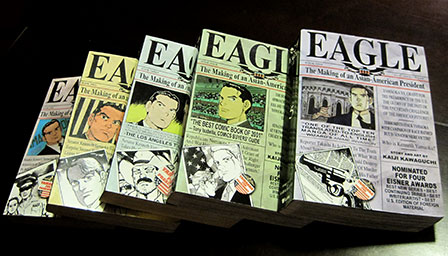Eagle: The Making of an Asian-American President
You may as well know from the outset that I'm not really in any way optimistic over the American body politic. It's a system that, for everything I can see, is essentially and fundamentally broken. As nation-wide protests have asserted in the last year, a very distinct minority wields the power in a nation that teaches its children to believe in democracy. "The will of the people" is routinely dismissed by those who would purport to be its servants. And even if the desires of the general populace were taken into consideration, the 99% are too ill-informed in the realms of history, economics, strategy, and political philosophy to be able to make adequate decisions in either national or international realms. We the people are puppets to our news sources, whether liberal or conservative or international or backwoods. If we are to gain leaders who will usher us into a golden age of peace and prosperity, it will be by accident.
You may call me a bit of a cynic—and you would be correct in that estimation. So what's a guy like me doing pretty thoroughly enjoying a book like Eagle: The Making of an Asian-American President: a book that in many ways is a celebration (or fetishization) of the American electoral process?
Honestly, part of it is novelty. The bare concept alone is interesting: 2264 pages following a candidate's campaign from the lead-up to the Democratic National Convention all the way through to the results of the Presidential Election—but written by a Japanese creator for a Japanese audience. Seeing how an outsider views and understands and interprets something that remains mysterious even to many Americans is a treasure of cross-cultural appreciation. When he mythologizes Texas, through heavy play on ranchers and late-night T-bones as big as your head, you can see where he's coming from. When he follows a trail into the sordid realm of labour union politics, American readers may well wonder how closely the author's original audience could relate (what with the differences in American and Japanese business ethics and practices). And when the book's candidate-of-choice, Kenneth Yamaoka, a third-gen Japanese-American senator (D-NY) is confronted by some of the racial difficulties that confronted Obama, you wonder how much it hurt to write those sentiments and how much author Kawaguchi was able to empathize with the more hateful elements he had to portray.
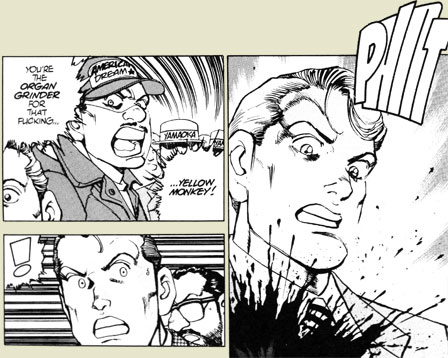 Wait. Isn't the organ grinder the one in charge? If this guy doesn't like East Asians, shouldn't he be happy that Yamaoka would be this guy's puppet? Racists, man: how do they work?
Wait. Isn't the organ grinder the one in charge? If this guy doesn't like East Asians, shouldn't he be happy that Yamaoka would be this guy's puppet? Racists, man: how do they work?
Eagle's subtitle (The Making of an Asian-American President) is interesting because you're pretty sure that Kawaguchi is giving away the whole bag of cookies at the outset. While reading, there may be some doubt in the occasional reader as to the author's destination, but as the story unfolds, presidential hopeful Yamaoka unveils to be perhaps the ultimate Mary Sue. There is no obstacle that he will not overcome—no scandal that will not either fade from memory instantly or turn out somehow to work in the anointed man's favour. It might be annoying if Yamaoka was ever really the point of the book. But he's not.
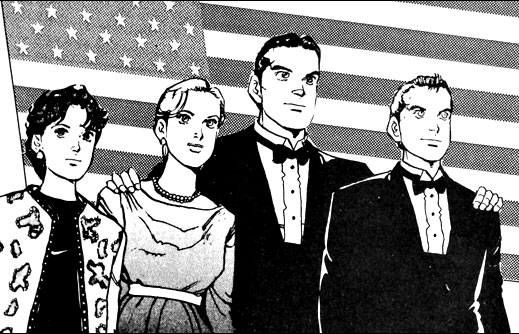 I like how similar Kawaguchi's people style is to Katsuhiro Otomo's.
I like how similar Kawaguchi's people style is to Katsuhiro Otomo's.
Kawaguchi's primary interest seems almost wholly concerned with exploring what it takes to become president of the United States. And since someone is undoubtedly going to become president, for Kawaguchi's purpose, it hardly matters who. He just needs readers to willingly tag along for the ride—most likely to see just how crazy a ride it actually is. Or at least how crazy it is in a Very Dramatic reading of the quad-annual script. To that end, he offers up a bit of melodrama.
Takashi Jo is our window into Senator Yamaoka's world. Jo is an unknown journalist for the Mainichi Shimbun and is mysteriously invited to all-access coverage of the senator's campaign the day after his mother mysteriously dies in a home gas leak. This mystery plagues Jo for the story's duration, but at least part of it (the fact that Senator Yamaoka is the secret father that Jo never met) is revealed in the first thirty pages of volume 1. Then Jo falls in love with Yamaoka's daughter, but it's okay because she's his adopted daughter. Probably. As I said, a bit of melodrama.
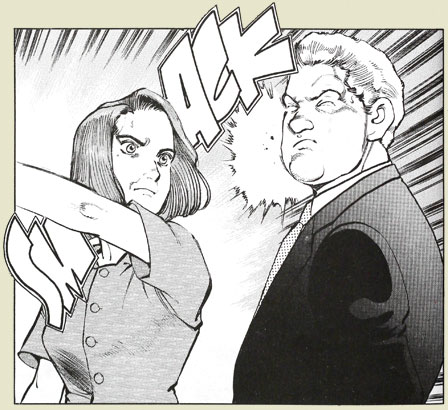 Bill Clinton, living the Republican Dream.
Bill Clinton, living the Republican Dream.
Still, Eagle is paced like a thriller. Whether we're wondering how Yamaoka is going to gain points on his latest rival or how Jo is going to react to the latest bombshell about his life, his love, or his parents, the trip is an exciting one. I first read Eagle as it was released in America around the turn of the century, but with all the presidential campaign hoo-ha going on the last couple months, I thought I'd like to reread the book. After all, I remembered enjoying it a decade ago. When I say it's paced like a thriller, I'm not kidding. I blew through all five 400+ page volumes in two days. I may have stretched my one-hour lunch breaks to an hour and ten. I had a hard time putting Kawaguchi's book down. It's like if you took Twilight or The DaVinci Code and made them smart and interesting. Basically, Kawaguchi created something like crack in bound paper form, which makes it all the more tragic that VIZ is no longer publishing the book. Apparently, it just wasn't as popular as I believe it probably ought to be.
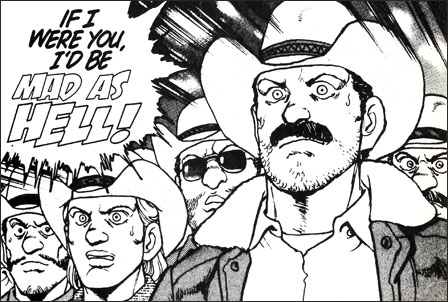 I would, too. It's a good book and deserves continued circulation.
I would, too. It's a good book and deserves continued circulation.
And again, this is coming from someone who doesn't like American politics. Kawaguchi asked me (through his series) to empathize with a politician and support a candidate for a presidential election—something I traditionally have found myself unable to do. It says something that, despite my jaded perspective on the political realm, I was happy to read about Senator Yamaoka and his dreams and purpose. Basically, Kawaguchi did for politics what Mitsuru Adachi did for baseball—he got me following the game. At least for the space of his book.
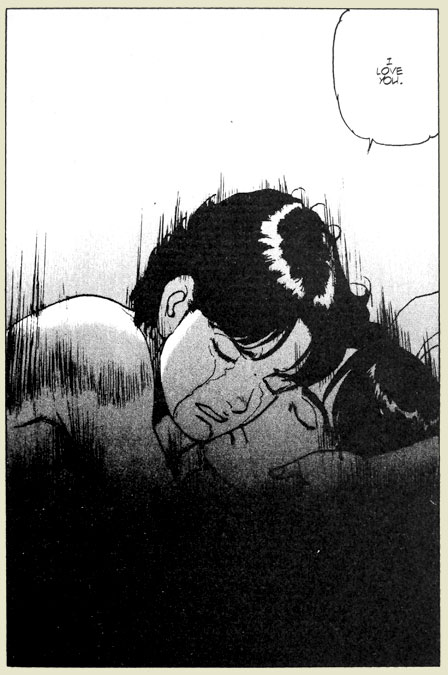 Just to prove I meant it with the promise of melodrama.
Just to prove I meant it with the promise of melodrama.
Also, you can't tell here, but Kawaguchi draws naked people funny and his women have awkward boobs. (Note: please don't be offended real people who look just like Kawaguchi's naked people.)
Good Ok Bad features reviews of comics, graphic novels, manga, et cetera using a rare and auspicious three-star rating system. Point systems are notoriously fiddly, so here it's been pared down to three simple possibilities:
3 Stars = Good
2 Stars = Ok
1 Star = Bad
I am Seth T. Hahne and these are my reviews.
Browse Reviews By
Other Features
- Best Books of the Year:
- Top 50 of 2024
- Top 50 of 2023
- Top 100 of 2020-22
- Top 75 of 2019
- Top 50 of 2018
- Top 75 of 2017
- Top 75 of 2016
- Top 75 of 2015
- Top 75 of 2014
- Top 35 of 2013
- Top 25 of 2012
- Top 10 of 2011
- Popular Sections:
- All-Time Top 500
- All the Boardgames I've Played
- All the Anime Series I've Seen
- All the Animated Films I've Seen
- Top 75 by Female Creators
- Kids Recommendations
- What I Read: A Reading Log
- Other Features:
- Bookclub Study Guides

